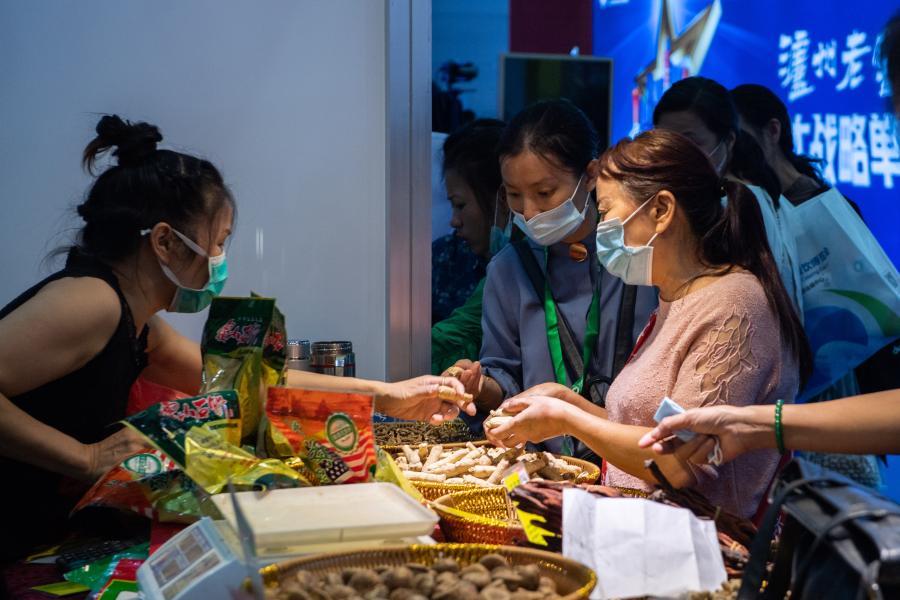-- The COVID-19 hit China's catering industry hard as the epidemic forced the temporary closure of many restaurants and saw cautious customers stay home rather than dine out.
-- As the epidemic has been generally contained, China's catering industry is seeing clear signs of recovery.
-- Experts say the catering consumption is expected to return to the pre-epidemic level by the end of the year.
CHANGSHA, Sept. 20 (Xinhua) -- As dinnertime approached, food aficionados began to form a long line at the entrance of a popular crayfish restaurant in Changsha, capital of central China's Hunan Province.
After the resumption of dine-in service on March 16, Wenhoyo Superb, also began accepting online reservations. However, many diners still line up at the gate.
"Our business began to gradually recover after the resumption of work. The online booking service helps a lot to prevent long queues and attract more customers," said Li Mingyue, a staffer with the brand.
The COVID-19 epidemic hit the Chinese catering industry hard as the epidemic forced the temporary closure of many restaurants and saw cautious customers stay home rather than dine out.
According to the National Bureau of Statistics, China's catering revenue was 1.46 trillion yuan (about 216 billion U.S. dollars) in the first half of this year, down 32.8 percent year on year.
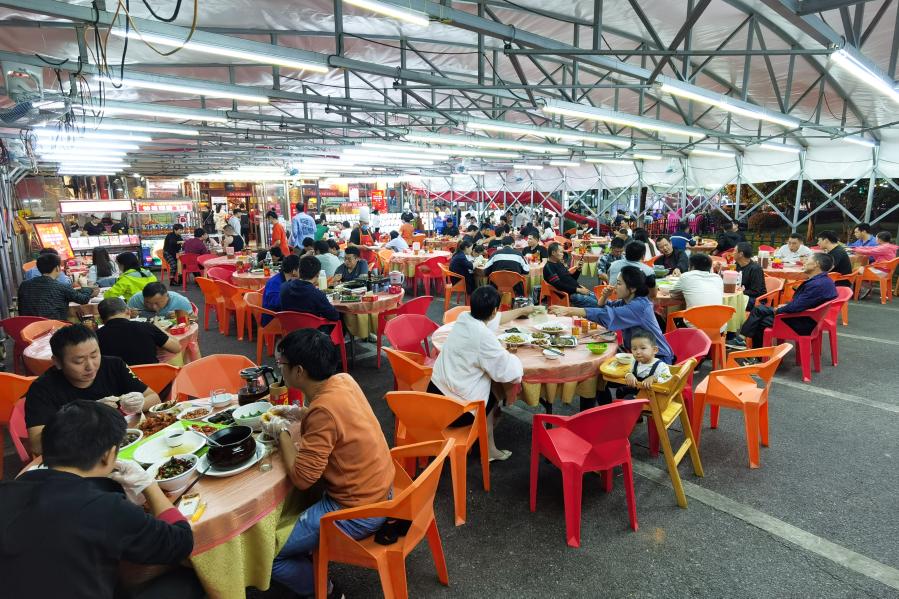
Customers dine at a restaurant in the Quantang community of Changsha, central China's Hunan Province, Sept. 19, 2020. (Xinhua/Chen Sihan)
As the epidemic has been generally contained, China's catering industry is seeing clear signs of recovery. The catering revenue decline narrowed to 11 percent year on year in July, and to 7 percent in August, new data showed.
"The catering consumption is expected to return to the pre-epidemic level by the end of the year," said Liu Yan, an expert with the China Hospitality Association.
FOOD AND CATERING EXPO
With the theme of "innovative integration, quality consumption," the 2020 China International Food & Catering Expo was held in Changsha from Friday to Sunday.
More than 2,000 companies from home and abroad participated in the expo, aiming to seek potential cooperation partners, promote products and services, and revive their business.
Given the epidemic's impact, the expo this year served as a crucial platform to stabilize the market and boost the orders of domestic food and catering enterprises.
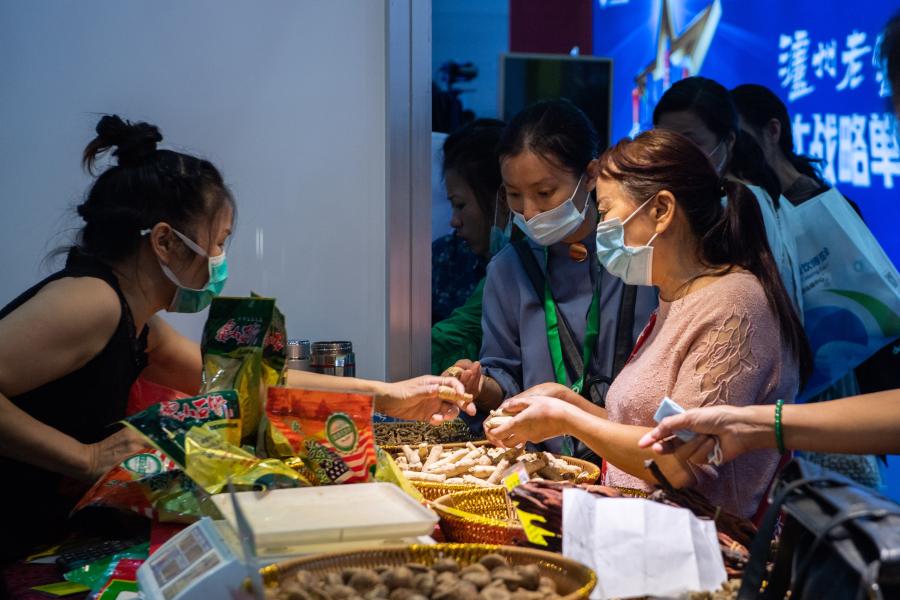
A customer (R) buys dry goods at the China International Food & Catering Expo in Changsha, central China's Hunan Province, Sept. 19, 2020. (Xinhua/Chen Sihan)
It is an excellent platform to promote Sino-British trade and exchange of the food and catering industry, and also brings opportunities for British companies to explore the Chinese mainland market, said Tom Simpson, managing director of the China operations of the China-Britain Business Council, at the event's opening ceremony.
INNOVATION AND RECOVERY
The epidemic has forced the catering sector to innovate, said Zhao Jingqiao, a researcher of the Chinese Academy of Social Sciences, at the expo.
Zhao said development trends including market integration, industry digitalization and capitalization, as well as internationalization and specialization of the division of labor will bring more opportunities to the catering sector.
Wenhoyo Superb has set up booths for other popular local food and beverage brands. While energizing other brands, the move helps attract more consumers and enrich the dining experience, said Li.
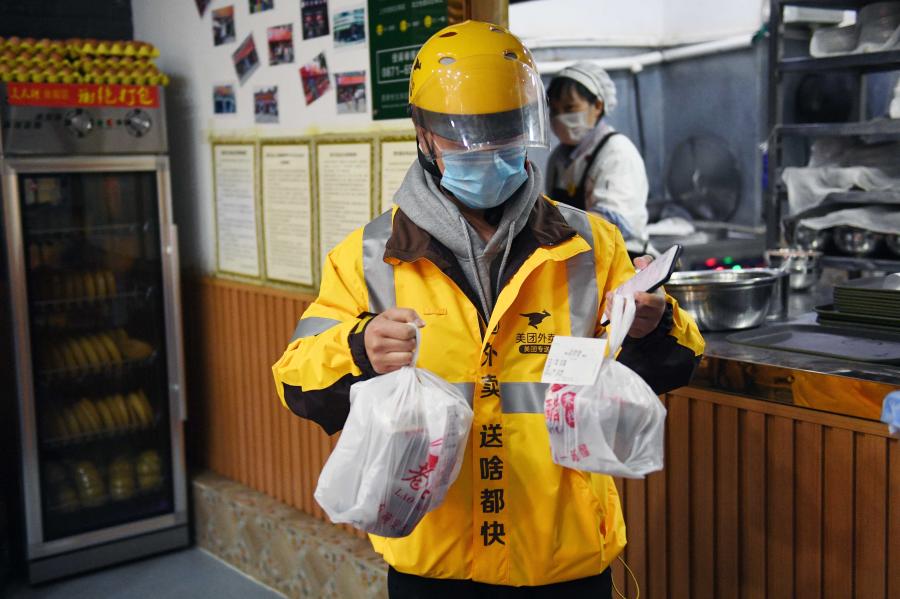
Food deliveryman He Xingwen picks up customer orders at a restaurant in Kunming, southwest China's Yunnan Province, March 16, 2020. (Xinhua/Yang Zongyou)
Meituan Dianping, a major e-commerce platform for services, launched a program in September to facilitate the digital transformation of the catering industry after the epidemic, which is expected to benefit about 1 million merchants within one year.
"Online catering platforms will help consumers make inquiries and reservations, and more accurately match supply and demand between consumers and catering enterprises," said Jiao Weiming, director of Meituan's consumption promotion center.
NEW TREND
As the nationwide "Clear your plate" campaign is gaining steam in China, many restaurants on Meituan have joined the movement and introduced "small-plate meals" to reduce food waste and lower prices.
Four associations in related sectors, including the China Cuisine Association, have recently issued a joint proposal with Meituan, calling on catering firms to promote thrift and combat food waste throughout the catering sector.
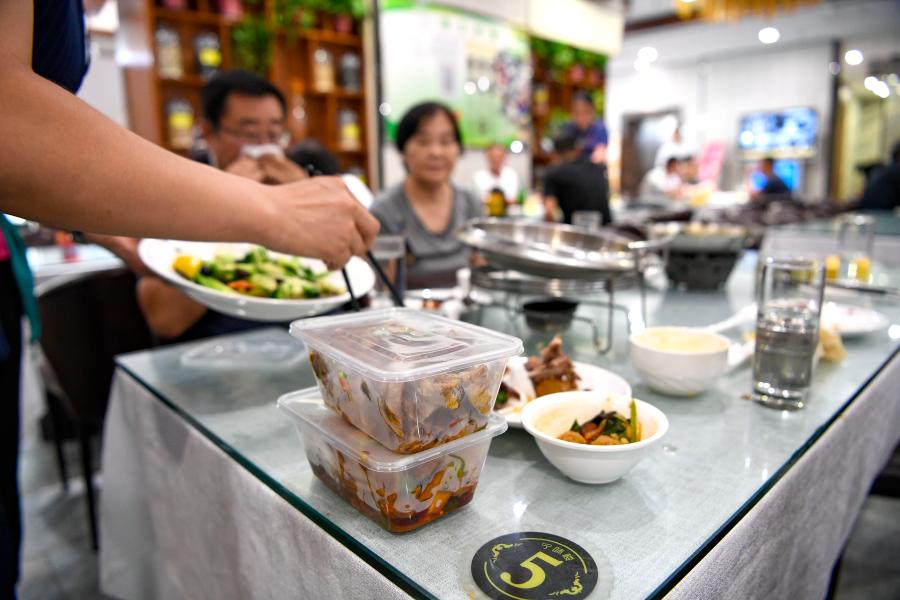
A restaurant staff member packs up leftover food for takeaway in Yinchuan, northwest China's Ningxia Hui Autonomous Region, Aug. 15, 2020. (Xinhua/Feng Kaihua)
At the same time, a Meituan system is helping restaurants forecast their daily turnover, monitor their inventory in real time, and estimate their purchase quantity, all in a bid to reduce food waste.
Meituan will provide more guidance for restaurant owners so that they can continue to share the dividends brought by the digital process and be properly equipped to face the challenges of online operations, said Wang Xing, CEO of Meituan.
(Reporting by Zhang Yujie, Xi Min, Liu Fangzhou, Xu Ruiqing)
(Video reporter: Feng Yuanyuan, Li Xiaobo, Ding Chunyu, and Cheng Ji'an; video editor: Lin Lin)




 A single purchase
A single purchase








